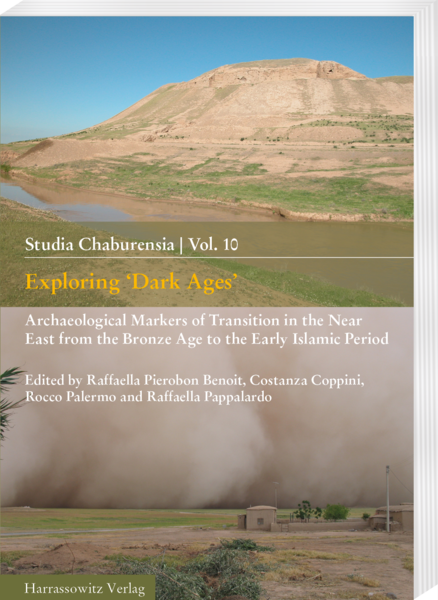Exploring ‘Dark Ages’: Archaeological Markers of Transition in the Near East from the Bronze Age to the Early Islamic Period

|
|
|
| Herausgeber: | Pierobon Benoit, Raffaella / Coppini, Costanza / Palermo, Rocco / Pappalardo, Raffaella | | Reihe: |
| | Bandnummer: | 10 | | Umfang/Format: | 165 pages, 55 ill., 10 tables | | Sprache: | English | | Ausstattung: | Book (Paperback) | | Abmessungen: | 17.00 × 24.00 cm | | Gewicht: | 365g | | Erscheinungsdatum: | 06.04.2022 | | Preise: | 45,00 Eur[D] / 46,30 Eur[A] | | ISBN: | 978-3-447-11755-5 | | DOI: | 10.13173/9783447117555 |
|
| This book is the result of a workshop organized by the editors on April
5, 2018, during the 11th International Congress on the Archaeology of
the Ancient Near East (ICAANE) in Munich, Germany.
The workshop’s
goal was to discuss the archaeological traces, or lack thereof, of the
so-called transitional periods in the long history of Northern
Mesopotamia, from the Bronze Age to the Islamic period. What emerges
from the contributions, which differ in terms of chronology, spatial
extent, and research subject – from single sites to long term
investigation, from material culture to historical approaches –, goes
beyond the traditional approach to the Dark Ages, emphasizing phenomena
of resilience and evolution, rather than drastic and abrupt changes.
From the expansion and contraction of settlement patterns to the spatial
redefinition of urban spaces and the persistence of certain ceramic
horizons through time, the authors put back the material evidence on the
agenda of the archaeological research on the Dark Ages.
The book
offers a unique view, although from different angles, of some of the
in-between periods of Mesopotamian history: The Middle-Late Bronze
transition, the so-called post-Assyrian period, the evolution of late
antiquity material culture into the Islamic period. Thus, the authors
aim at redefining the concept of transition in the light of new or
revised data from fundamental projects in Syria, Iraq, and Iraqi
Kurdistan. |
|
|
|
|
|
|
|
|
|
|
|
|
|
|
|
|
|
|
No comments:
Post a Comment